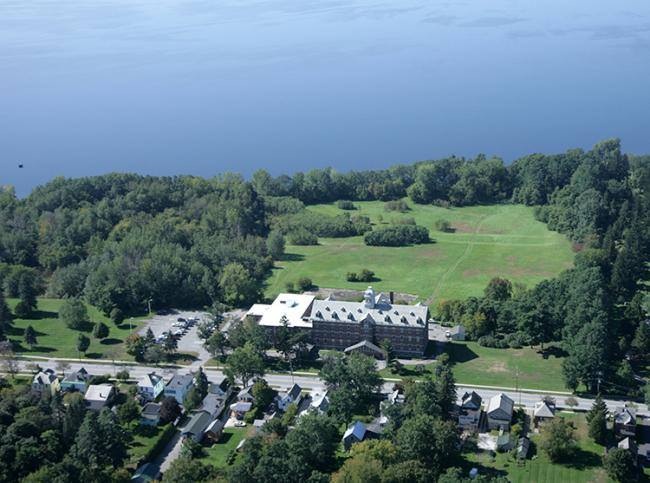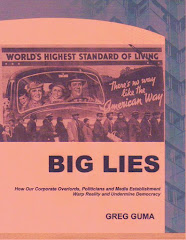Dynamic Tensions: Howard Dean's rise and fall, Vermont's tea party and gay marriage, Frank Bryan on town meeting civility, protesting nukes, Nader on corporate power, and Sanders on misplaced anger. A Maverick video:
Also check out Part 1
Thursday, January 28, 2010
Tuesday, January 19, 2010
Vermont's Progressive Dilemma, part 1
The Green Mountain State has championed many progressive causes and elected a socialist Senator. But it's still part of an uneasy empire, and some people want out of the "big muddy." A Maverick video essay:
Friday, January 15, 2010
Haiti: From Revolution to Disaster
Earlier today I received a message from a Haitian American student wondering what I thought might happen as a result of US intervention to help Haiti survive and recover from a catastrophic earthquake. She’d read something I had written about that beautiful but beleaguered nation and wanted to know what I thought.
 “I'm not fond of the idea of U.S. troops occupying my parents’ country ‘for its own good’,” she wrote. “And I know how they exploited the country's unstable politics to further their own business interests in the past.” What’s in store for us? She asked.
“I'm not fond of the idea of U.S. troops occupying my parents’ country ‘for its own good’,” she wrote. “And I know how they exploited the country's unstable politics to further their own business interests in the past.” What’s in store for us? She asked.
My reply wasn’t that enlightening. “What you suspect is certainly possible,” I had to admit. “But not inevitable. And right now the immensity of this tragedy requires a global response, which should and must include the US.” That being the case, she makes a good point. An extended international presence is very likely to produce, along with necessary reconstruction, a long-desired corporate re-colonization. A devil’s bargain – though certainly not the bizarre kind claimed by that demented tele-preacher Pat Robertson.
So, as we send our contributions and watch for signs of hope and progress, let’s also consider carefully the history and nature of the place, and the high price of “humanitarian intervention.”
Here are some of my previous thoughts on the subject, followed by a list of organizations trying to help:
Occupational Hazards
The First US Takeover of Haiti set the Stage for Later Interventions
In July 1915, Haiti's head of state, Vilbrun Guillaume Sam, was cornered in the French embassy by rebel forces. The insurgents had widespread popular support. This was no shock, since Sam was known as a rampaging, vindictive thug who had seized the government by force and murdered hundreds of his political enemies before running for cover. When a mob finally found him cowering in an attic, they hacked their president to pieces.
In the previous four years, the island nation had been through seven presidents, most of them killed or removed prematurely. The rural north was under the control of the Cacos, a rebel movement that adopted its name from the cry of a native bird. Although widely portrayed as a group of murderous bandits, the Cacos were essentially nationalists, and were attempting to resist the control of France, the US, and the small minority of mulattos who dominated the economy.
Clearly, a Haiti run by rebels and peasants was not acceptable to the US, which considered the nation an endangered investment property…
Complete Article: Occupational Hazards
Hard Times in Duvalier’s Haiti
As I walked across a hot, treeless airfield from the plane to the ramshackle Duvalier International Terminal building in March 1977, a row of black faces stared down from the second floor balcony. Later, on the cab ride into the city, we passed wave after wave of makeshift houses and thousands of thin, dark Haitians.
The poverty was extreme; starving dogs searching the dirt roads, mothers cradling emaciated babies in their bony arms, young men struggling with huge carts of charcoal. Naked children, lanky teens and hobbled old folks wandered listlessly down the rutted roads. Drivers talked with their horns. Some people dressed in simple “western” clothing, and there were a few modern cars. But the tiny middle class was eclipsed by the pervasive deprivation…
Complete Article: Hard Times
Baby Doc’s Haiti: Low Expectations
After Papa Doc Duvalier’s death in 1971 Haiti attracted some renewed financial interest from the US, France, Germany and Canada. Most of it came in the form of loans, however, so the country’s deficit grew. Projects were launched only to be abandoned. A World Food Program administrator explained it to me this way: “The real problem in any project here is maintenance. After you spend several years developing crops or putting up buildings there’s no grassroots support for keeping it going, no decentralization of effort. When money comes into the country it goes directly to Port-au-Prince.”
He was just as skeptical about tourism. “People on cruises don’t spend much money and don’t stay long,” he said. “Tourism isn’t the way for Haiti to go, the income won’t reach the peasants. It will go to the resort owners.”…
Complete Article: Low Expectations
Poverty and Privilege
At noon we waited for the electricity, watching the bare light bulb for a sign. In the afternoon we drank rum and listened to reggae music. After the lights went out again at five we picked out nodes of brightness – hotels, hospitals, the palace, the “Vive Duvalier President a Vie” neon sign downtown…
Complete Article: Poverty and Privilege
Dirty Tricks in Haiti (2004)
Aristide's removal points to a regional destabilization
The first time US intervened in Haiti, not many people even noticed. Few journalists were on hand in 1915, and most newspapers were ready to accept the official version. According to President Woodrow Wilson, establishing a protectorate was part of a grand effort to halt a "radically evil and corrupting" revolution, support the "slow process of reform," and extend his policy of the "open door to the world."
But that was just the cover story. Actually, Wilson saw the island nation as a geo-strategic pawn in the build up to World War I; specifically, he was worried that Germany might take advantage of the local political turmoil to establish a military base in the hemisphere. He also had other, even stronger economic reasons to seize control of the country...
Complete Story: Dirty Tricks
If you want to help:
International charities are beginning to organize. Here are some of the aid organizations responding to the disaster:
American Jewish World Service
AmeriCares
CARE
Catholic Relief Services
Direct Relief International
Doctors Without Borders
International Committee of the Red Cross
International Rescue Committee
Mercy Corps
Oxfam
Partners in Health
The Salvation Army
Save the Children
UNICEF
World Food Programme
The American Red Cross and Yele Haiti can accept donations by text message: Text "HAITI" to 90999 to donate $10 to American Red Cross relief for Haiti, or "YELE" to 501501 to donate $5 to the Yele Haiti Earthquake Fund. These donations are charged to your cell phone bill.
This list is just a starting point and I can’t vouch for the groups mentioned. But online tools are available for evaluating charities and making donations to NGOs, including CharityNavigator.org and NetworkForGood.org.
 “I'm not fond of the idea of U.S. troops occupying my parents’ country ‘for its own good’,” she wrote. “And I know how they exploited the country's unstable politics to further their own business interests in the past.” What’s in store for us? She asked.
“I'm not fond of the idea of U.S. troops occupying my parents’ country ‘for its own good’,” she wrote. “And I know how they exploited the country's unstable politics to further their own business interests in the past.” What’s in store for us? She asked.My reply wasn’t that enlightening. “What you suspect is certainly possible,” I had to admit. “But not inevitable. And right now the immensity of this tragedy requires a global response, which should and must include the US.” That being the case, she makes a good point. An extended international presence is very likely to produce, along with necessary reconstruction, a long-desired corporate re-colonization. A devil’s bargain – though certainly not the bizarre kind claimed by that demented tele-preacher Pat Robertson.
So, as we send our contributions and watch for signs of hope and progress, let’s also consider carefully the history and nature of the place, and the high price of “humanitarian intervention.”
Here are some of my previous thoughts on the subject, followed by a list of organizations trying to help:
Occupational Hazards
The First US Takeover of Haiti set the Stage for Later Interventions
In July 1915, Haiti's head of state, Vilbrun Guillaume Sam, was cornered in the French embassy by rebel forces. The insurgents had widespread popular support. This was no shock, since Sam was known as a rampaging, vindictive thug who had seized the government by force and murdered hundreds of his political enemies before running for cover. When a mob finally found him cowering in an attic, they hacked their president to pieces.
In the previous four years, the island nation had been through seven presidents, most of them killed or removed prematurely. The rural north was under the control of the Cacos, a rebel movement that adopted its name from the cry of a native bird. Although widely portrayed as a group of murderous bandits, the Cacos were essentially nationalists, and were attempting to resist the control of France, the US, and the small minority of mulattos who dominated the economy.
Clearly, a Haiti run by rebels and peasants was not acceptable to the US, which considered the nation an endangered investment property…
Complete Article: Occupational Hazards
Hard Times in Duvalier’s Haiti
As I walked across a hot, treeless airfield from the plane to the ramshackle Duvalier International Terminal building in March 1977, a row of black faces stared down from the second floor balcony. Later, on the cab ride into the city, we passed wave after wave of makeshift houses and thousands of thin, dark Haitians.
The poverty was extreme; starving dogs searching the dirt roads, mothers cradling emaciated babies in their bony arms, young men struggling with huge carts of charcoal. Naked children, lanky teens and hobbled old folks wandered listlessly down the rutted roads. Drivers talked with their horns. Some people dressed in simple “western” clothing, and there were a few modern cars. But the tiny middle class was eclipsed by the pervasive deprivation…
Complete Article: Hard Times
Baby Doc’s Haiti: Low Expectations
After Papa Doc Duvalier’s death in 1971 Haiti attracted some renewed financial interest from the US, France, Germany and Canada. Most of it came in the form of loans, however, so the country’s deficit grew. Projects were launched only to be abandoned. A World Food Program administrator explained it to me this way: “The real problem in any project here is maintenance. After you spend several years developing crops or putting up buildings there’s no grassroots support for keeping it going, no decentralization of effort. When money comes into the country it goes directly to Port-au-Prince.”
He was just as skeptical about tourism. “People on cruises don’t spend much money and don’t stay long,” he said. “Tourism isn’t the way for Haiti to go, the income won’t reach the peasants. It will go to the resort owners.”…
Complete Article: Low Expectations
Poverty and Privilege
At noon we waited for the electricity, watching the bare light bulb for a sign. In the afternoon we drank rum and listened to reggae music. After the lights went out again at five we picked out nodes of brightness – hotels, hospitals, the palace, the “Vive Duvalier President a Vie” neon sign downtown…
Complete Article: Poverty and Privilege
Dirty Tricks in Haiti (2004)
Aristide's removal points to a regional destabilization
The first time US intervened in Haiti, not many people even noticed. Few journalists were on hand in 1915, and most newspapers were ready to accept the official version. According to President Woodrow Wilson, establishing a protectorate was part of a grand effort to halt a "radically evil and corrupting" revolution, support the "slow process of reform," and extend his policy of the "open door to the world."
But that was just the cover story. Actually, Wilson saw the island nation as a geo-strategic pawn in the build up to World War I; specifically, he was worried that Germany might take advantage of the local political turmoil to establish a military base in the hemisphere. He also had other, even stronger economic reasons to seize control of the country...
Complete Story: Dirty Tricks
If you want to help:
International charities are beginning to organize. Here are some of the aid organizations responding to the disaster:
American Jewish World Service
AmeriCares
CARE
Catholic Relief Services
Direct Relief International
Doctors Without Borders
International Committee of the Red Cross
International Rescue Committee
Mercy Corps
Oxfam
Partners in Health
The Salvation Army
Save the Children
UNICEF
World Food Programme
The American Red Cross and Yele Haiti can accept donations by text message: Text "HAITI" to 90999 to donate $10 to American Red Cross relief for Haiti, or "YELE" to 501501 to donate $5 to the Yele Haiti Earthquake Fund. These donations are charged to your cell phone bill.
This list is just a starting point and I can’t vouch for the groups mentioned. But online tools are available for evaluating charities and making donations to NGOs, including CharityNavigator.org and NetworkForGood.org.
Labels:
Democracy,
Economics,
Haiti,
History,
Media Analysis,
Perception Management,
War and Peace
Wednesday, January 13, 2010
The Next Level: World Order
Part 24 of Prisoners of the Real
In times of turmoil, we often hear urgent calls for some form of "globalized" decision-making. The argument goes that growth, development, and crises have propelled humanity from the tribe to the village, from there to the city-state, and most recently to the nation-state. The next inevitable step is a world system.
Is it an unrealistic idea? History does demonstrate that uneven growth leads to conflict and war. The renowned system theorist Ervin Laszlo once put it this way:
"As long as regulation in the world system is vested in national governments, and national governments strive to maximize their sovereign national interests defined in terms of wealth and power, the global situation remains highly unstable."
For many advocates of global decision-making, this suggests two goals: to establish a humanistic world order, and to make the world more stable and orderly. Since it's unlikely – barring a technological meltdown – that we will return to an age of simpler technology, many globalists argue that the only choice, as Laszlo wrote, is to "lift the level of social technics to a corresponding level." In other words, national governments must surrender control to a world-level organization.
 This strategy, based on the belief that errors of "scientific rationality" can be counteracted with more of the same, echoes the logic of philosopher Thomas Hobbes. Although rejecting Hobbes' argument that what we need is absolute monarchy, thinkers like Laszlo agree with the basic approach: surrendered sovereignty in exchange for collective security and shared wealth. This is as relevant today in the contemplation of world government, he wrote in Strategy for the Future, as it was in the past to the vision of a rational political order on the national scale. Since both assume that human beings are essentially selfish individualists, pursuing their own goals at the expense of their neighbors, "world order" seems to them only "workable" alternative.
This strategy, based on the belief that errors of "scientific rationality" can be counteracted with more of the same, echoes the logic of philosopher Thomas Hobbes. Although rejecting Hobbes' argument that what we need is absolute monarchy, thinkers like Laszlo agree with the basic approach: surrendered sovereignty in exchange for collective security and shared wealth. This is as relevant today in the contemplation of world government, he wrote in Strategy for the Future, as it was in the past to the vision of a rational political order on the national scale. Since both assume that human beings are essentially selfish individualists, pursuing their own goals at the expense of their neighbors, "world order" seems to them only "workable" alternative.
Hobbes' error, said Laszo, wasn't his view of humanity, or his notion of surrendered sovereignty, but rather the lack of an appropriate implementation plan. It must be realistic, practical and possible within an acceptable time frame; that is, before environmental catastrophe or world war make it irrelevant. Like most advocates of world government, Laszlo worked out many of the details, including roles for various members of his ideal global network.
Similiar designs, some arguably more egalitarian, were developed during the 1970s by a blue-ribbon group calling itself the World Order Models Project (WOMP). Among its members were Institute for Policy Studies founder Richard Barnet, Johnson-era Defense Secretary Robert McNamara, and C. Douglas Dillon, a well-connected statesman and Council on Foreign Relations director who chaired the effort with funding from the Rockefeller Foundation. The project's main assumption was that the planet is in dire need of some form of "central guidance," which they defined as a "unified capacity for policy-formation, -coordination and -implementation." State sovereignty, particularly in regard to security and environmental matters, "impedes rational management of these issues areas." National governments are neither responsive to external pressures nor able to protect people from adverse developments, they concluded.
Looking back at the evolution of the world society, WOMP advised that science, technology, politics and social change pull humanity inexorably toward some form of world order. The group's preferred model combined central guidance with "wide dispersion of authority and distribution of power," an apparent contradiction they hoped to see resolved in a transition phase that builds up the role of the United Nations and various specialized agencies. They admitted, however, that other outcomes are also possible, and perhaps more likely.
How might it go? Forced by various crises to assume control over global resources and put down challenges to order, the major nations might eventually impose some form of world government. Another possibility is that regional movements toward economic and political integration could serve as a transitional phase that de-emphasizes national sovereignty while preserving some diversity. The latter is perhaps easier to imagine, based on the late 20th century birth of the European Union, the gradual economic integration of the Americas, and the emergence of the Pacific Rim as a regional power. However, such a regionalist model isn't inconsistent with the less altruistic designs of foreign policy elitists like Henry Kissinger.
 During the Nixon era, Kissinger's five-power variation on the theme of world order gained considerable force. The idea was that the tendency of the current world system to oligopoly (economic control by the few) would be maximized by the main actors: the US, Soviet Union, Western Europe, Japan, and China. Under this arrangement, ideological differences would be minimized and destructive rivalries eliminated, but little would be done to reduce poverty, repression, and violence. This “five-power” plan aimed at intergovernmental management, yet ignored the need for human solidarity and denied the rights of smaller nations and millions of individuals.
During the Nixon era, Kissinger's five-power variation on the theme of world order gained considerable force. The idea was that the tendency of the current world system to oligopoly (economic control by the few) would be maximized by the main actors: the US, Soviet Union, Western Europe, Japan, and China. Under this arrangement, ideological differences would be minimized and destructive rivalries eliminated, but little would be done to reduce poverty, repression, and violence. This “five-power” plan aimed at intergovernmental management, yet ignored the need for human solidarity and denied the rights of smaller nations and millions of individuals.
Political earthquakes of recent years – the dissolution of the Soviet Union, abuses of presidential power, conflict in the Middle East, the emergence of Europe and Asia as economic powerhouses, and "wars" involving violent fundamentalists – have spurred yet another reconsideration of the existing international order. Despite the tremors, many people hope to simply maintain and enhance the status quo, perhaps with a revised role for the UN and economic decision-making by international financial institutions such as the World Trade Organization. In that case, some form of central guidance could evolve – probably a combination of the Kissinger plan and a regionally-based approach.
Nevertheless, some experts continue to insist that the only solution is either transformation or transcendence of the current world order. Transformation might involve reforming the UN to make it considerably more representative, competent, and powerful. Transcendence generally means replacing the UN with some form of world parliament or a full-fledged world government, finishing with the nation-state once and for all. Though it's hard to imagine, given the widespread suspicion about any form of global governance involving surrendered sovereignty, many theorists – and even few politicians – insist that global problems ultimately will give birth to world solutions.
Next: A Guide to Lifeboat Ethics
To read other chapters, go to Prisoners of the Real: An Odyssey
In times of turmoil, we often hear urgent calls for some form of "globalized" decision-making. The argument goes that growth, development, and crises have propelled humanity from the tribe to the village, from there to the city-state, and most recently to the nation-state. The next inevitable step is a world system.
Is it an unrealistic idea? History does demonstrate that uneven growth leads to conflict and war. The renowned system theorist Ervin Laszlo once put it this way:
"As long as regulation in the world system is vested in national governments, and national governments strive to maximize their sovereign national interests defined in terms of wealth and power, the global situation remains highly unstable."
For many advocates of global decision-making, this suggests two goals: to establish a humanistic world order, and to make the world more stable and orderly. Since it's unlikely – barring a technological meltdown – that we will return to an age of simpler technology, many globalists argue that the only choice, as Laszlo wrote, is to "lift the level of social technics to a corresponding level." In other words, national governments must surrender control to a world-level organization.
 This strategy, based on the belief that errors of "scientific rationality" can be counteracted with more of the same, echoes the logic of philosopher Thomas Hobbes. Although rejecting Hobbes' argument that what we need is absolute monarchy, thinkers like Laszlo agree with the basic approach: surrendered sovereignty in exchange for collective security and shared wealth. This is as relevant today in the contemplation of world government, he wrote in Strategy for the Future, as it was in the past to the vision of a rational political order on the national scale. Since both assume that human beings are essentially selfish individualists, pursuing their own goals at the expense of their neighbors, "world order" seems to them only "workable" alternative.
This strategy, based on the belief that errors of "scientific rationality" can be counteracted with more of the same, echoes the logic of philosopher Thomas Hobbes. Although rejecting Hobbes' argument that what we need is absolute monarchy, thinkers like Laszlo agree with the basic approach: surrendered sovereignty in exchange for collective security and shared wealth. This is as relevant today in the contemplation of world government, he wrote in Strategy for the Future, as it was in the past to the vision of a rational political order on the national scale. Since both assume that human beings are essentially selfish individualists, pursuing their own goals at the expense of their neighbors, "world order" seems to them only "workable" alternative.
Hobbes' error, said Laszo, wasn't his view of humanity, or his notion of surrendered sovereignty, but rather the lack of an appropriate implementation plan. It must be realistic, practical and possible within an acceptable time frame; that is, before environmental catastrophe or world war make it irrelevant. Like most advocates of world government, Laszlo worked out many of the details, including roles for various members of his ideal global network.
Similiar designs, some arguably more egalitarian, were developed during the 1970s by a blue-ribbon group calling itself the World Order Models Project (WOMP). Among its members were Institute for Policy Studies founder Richard Barnet, Johnson-era Defense Secretary Robert McNamara, and C. Douglas Dillon, a well-connected statesman and Council on Foreign Relations director who chaired the effort with funding from the Rockefeller Foundation. The project's main assumption was that the planet is in dire need of some form of "central guidance," which they defined as a "unified capacity for policy-formation, -coordination and -implementation." State sovereignty, particularly in regard to security and environmental matters, "impedes rational management of these issues areas." National governments are neither responsive to external pressures nor able to protect people from adverse developments, they concluded.
Looking back at the evolution of the world society, WOMP advised that science, technology, politics and social change pull humanity inexorably toward some form of world order. The group's preferred model combined central guidance with "wide dispersion of authority and distribution of power," an apparent contradiction they hoped to see resolved in a transition phase that builds up the role of the United Nations and various specialized agencies. They admitted, however, that other outcomes are also possible, and perhaps more likely.
How might it go? Forced by various crises to assume control over global resources and put down challenges to order, the major nations might eventually impose some form of world government. Another possibility is that regional movements toward economic and political integration could serve as a transitional phase that de-emphasizes national sovereignty while preserving some diversity. The latter is perhaps easier to imagine, based on the late 20th century birth of the European Union, the gradual economic integration of the Americas, and the emergence of the Pacific Rim as a regional power. However, such a regionalist model isn't inconsistent with the less altruistic designs of foreign policy elitists like Henry Kissinger.
 During the Nixon era, Kissinger's five-power variation on the theme of world order gained considerable force. The idea was that the tendency of the current world system to oligopoly (economic control by the few) would be maximized by the main actors: the US, Soviet Union, Western Europe, Japan, and China. Under this arrangement, ideological differences would be minimized and destructive rivalries eliminated, but little would be done to reduce poverty, repression, and violence. This “five-power” plan aimed at intergovernmental management, yet ignored the need for human solidarity and denied the rights of smaller nations and millions of individuals.
During the Nixon era, Kissinger's five-power variation on the theme of world order gained considerable force. The idea was that the tendency of the current world system to oligopoly (economic control by the few) would be maximized by the main actors: the US, Soviet Union, Western Europe, Japan, and China. Under this arrangement, ideological differences would be minimized and destructive rivalries eliminated, but little would be done to reduce poverty, repression, and violence. This “five-power” plan aimed at intergovernmental management, yet ignored the need for human solidarity and denied the rights of smaller nations and millions of individuals.
Political earthquakes of recent years – the dissolution of the Soviet Union, abuses of presidential power, conflict in the Middle East, the emergence of Europe and Asia as economic powerhouses, and "wars" involving violent fundamentalists – have spurred yet another reconsideration of the existing international order. Despite the tremors, many people hope to simply maintain and enhance the status quo, perhaps with a revised role for the UN and economic decision-making by international financial institutions such as the World Trade Organization. In that case, some form of central guidance could evolve – probably a combination of the Kissinger plan and a regionally-based approach.
Nevertheless, some experts continue to insist that the only solution is either transformation or transcendence of the current world order. Transformation might involve reforming the UN to make it considerably more representative, competent, and powerful. Transcendence generally means replacing the UN with some form of world parliament or a full-fledged world government, finishing with the nation-state once and for all. Though it's hard to imagine, given the widespread suspicion about any form of global governance involving surrendered sovereignty, many theorists – and even few politicians – insist that global problems ultimately will give birth to world solutions.
Next: A Guide to Lifeboat Ethics
To read other chapters, go to Prisoners of the Real: An Odyssey
Labels:
Democracy,
History,
Theory,
War and Peace
Monday, January 11, 2010
Subscribe to:
Posts (Atom)






























